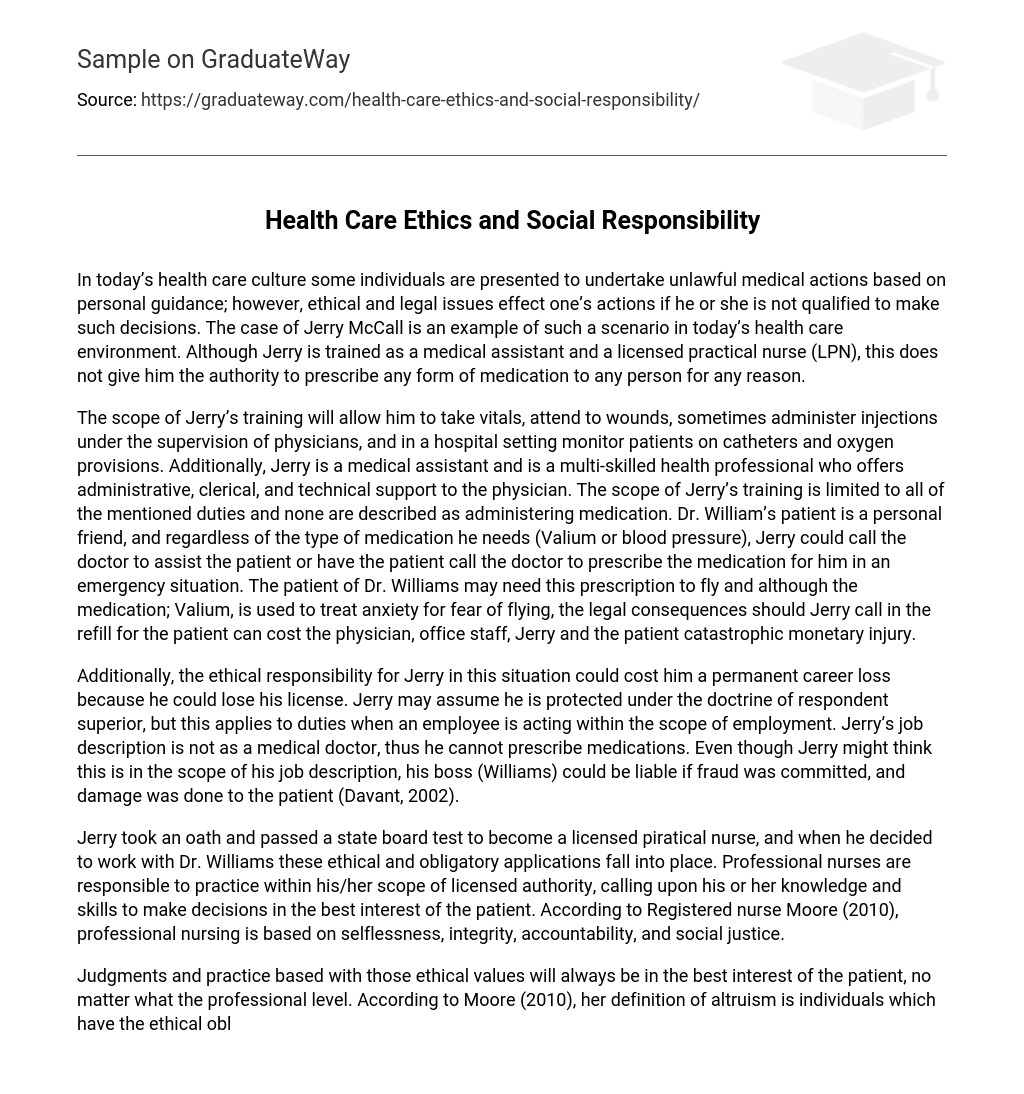In today’s health care culture some individuals are presented to undertake unlawful medical actions based on personal guidance; however, ethical and legal issues effect one’s actions if he or she is not qualified to make such decisions. The case of Jerry McCall is an example of such a scenario in today’s health care environment. Although Jerry is trained as a medical assistant and a licensed practical nurse (LPN), this does not give him the authority to prescribe any form of medication to any person for any reason.
The scope of Jerry’s training will allow him to take vitals, attend to wounds, sometimes administer injections under the supervision of physicians, and in a hospital setting monitor patients on catheters and oxygen provisions. Additionally, Jerry is a medical assistant and is a multi-skilled health professional who offers administrative, clerical, and technical support to the physician. The scope of Jerry’s training is limited to all of the mentioned duties and none are described as administering medication. Dr. William’s patient is a personal friend, and regardless of the type of medication he needs (Valium or blood pressure), Jerry could call the doctor to assist the patient or have the patient call the doctor to prescribe the medication for him in an emergency situation. The patient of Dr. Williams may need this prescription to fly and although the medication; Valium, is used to treat anxiety for fear of flying, the legal consequences should Jerry call in the refill for the patient can cost the physician, office staff, Jerry and the patient catastrophic monetary injury.
Additionally, the ethical responsibility for Jerry in this situation could cost him a permanent career loss because he could lose his license. Jerry may assume he is protected under the doctrine of respondent superior, but this applies to duties when an employee is acting within the scope of employment. Jerry’s job description is not as a medical doctor, thus he cannot prescribe medications. Even though Jerry might think this is in the scope of his job description, his boss (Williams) could be liable if fraud was committed, and damage was done to the patient (Davant, 2002).
Jerry took an oath and passed a state board test to become a licensed piratical nurse, and when he decided to work with Dr. Williams these ethical and obligatory applications fall into place. Professional nurses are responsible to practice within his/her scope of licensed authority, calling upon his or her knowledge and skills to make decisions in the best interest of the patient. According to Registered nurse Moore (2010), professional nursing is based on selflessness, integrity, accountability, and social justice.
Judgments and practice based with those ethical values will always be in the best interest of the patient, no matter what the professional level. According to Moore (2010), her definition of altruism is individuals which have the ethical obligation to serve others without self-interest. The nurse who comes from an altruistic place will make decisions that are in the best interest of the patient. He or she is a patient advocate.
Jerry knows the scope of his license and should he choose to make the call to the pharmacy, he will put all involved at risk for legal ramifications. Jerry does not have any protection from the law if Dr. William’s patient is given the refill of Valium requested by Jerry to the pharmacy because it is simply against the law Dong (2007). Implementing problem-solving methods in a health care environment could eliminate this scenario at inception. Organizations oftentimes use different examples to enforce possible mistakes occurring within the company.
Meetings, conferences, training sessions and other means of insightful education of the laws and ethical obligations of one’s job will eliminate any future doubt of what is allowed in the office, hospital, or anywhere an individual will come in contact with patients. Although many health care individuals are delivered with difficult decisions in ones working environment, instilling ethical and lawful standards in the scope of one’s job description and duties may eliminate ramifications of legal actions.
References
Davant, Charles, IV. 2002. “Employer Liability for Employee Fraud: Apparent Authority or Respondent Superior?” South Dakota Law Review 47 (fall): 554–582. Dong, D. Pharm. D. (2007) Pharmacy & drug enforcement agency laws and regulations. Retrieved December 1, 2010 from www.ucop.edu/audit/conference/.. /pharm_drugenforcement.ppt Moore, C. RN. (2010). Professional Accountability. Retrieved November 17, 2010 from http://www.bellaonline.com/articles/art57183.asp





